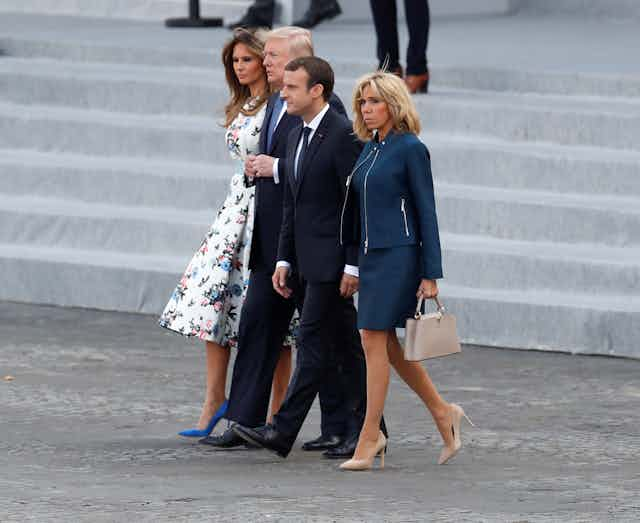The Franco-American alliance needs no introduction, but oblige me for a moment because French President Emmanuel Macron’s invitation to Donald Trump to attend the Bastille Day celebrations was too perfect a metaphor for the relationship between France and the United States not to unpack.
Despite (frequent) feuds, relations between the two countries are anchored by the weight of history. They are also subject to complicated trends – not all of them positive – and often undermined by trivial disputes.
Still, as both current presidents seem to realise, these destructive tendencies must be contained.
The cornerstones of the relationship
Paris and Washington are traditional allies whose political and military cooperation is essential. Despite some important differences, their political philosophies are similar.
Though the countries sometimes compete in cut-throat economic and trade relations, France and the US have never been at war with each other (which cannot be said for such French allies as England, Spain, Italy and, of course, Germany).
France even played a major role in America’s Revolutionary War against England, in the 18th century, and the US played a role in ensuring France’s survival against German expansionism some 140 years later.
This is what both countries celebrated together this Bastille Day, which coincided with the 100th anniversary of the first US troops on French soil in 1917, the first world war analogue to the history-changing invasion of Normandy on June 6 1944.
Franco-American military, political and intelligence cooperation remains crucial from the African Sahel to the Middle East. In Washington, France’s on-the-ground knowledge of Africa is held in high regard, as shown in US-supported interventions in Mali and Central African Republic in 2013.
Further, both countries are liberal and democratic. Their differences were thoroughly recorded by Alexis de Tocqueville (1805-1859) in his time, but when push comes to shove, France and the US have always stood together against authoritarian regimes, even when their leaders were not necessarily close.
To quote former French president general Charles de Gaulle from a 1965 interview, “In truth, who has been America’s staunchest ally, if not France…? Should the worst happen, should the freedom of the world come under threat, who would be the most obvious allies, if not France and the United States?”
Each country’s particularities, though, can irk the other. The French attachment to Jean-Jacques Rousseau’s notion of the common good does not always go down well in the US, where it can be seen as an unbearable constraint on individual freedom. And the American Madisonian idea that special interests can coexist within a democratic system is often seen in France as an intolerable obstacle to equality.
These special interests, both industrial and otherwise, make France and the US competitors, fierce rivals in trade and finance. Allies or not, many powerful Americans would be happy to see strategic European sectors, such as aeronautics and defence, disappear altogether.
Dangerous liaisons
Modern history abounds with squabbles between the two nations. Their presidential regimes are indubitably conducive to ego clashes: at major summits, both France and the US are represented by their heads of state, while most other allies are represented by “only” the executive-branch leader (prime minister or chancellor).
The underlying tensions around the official etiquette of this situation may be accentuated when contemporaneous presidents have different political sensibilities, as they so often seem to: think Jacques Chirac and George W. Bush or Nicolas Sarkozy and Barack Obama.
These discrepancies are manifest in the French obsession with showing its powerful partner that France is a “friend and ally, but not aligned”, in the words of former minister of foreign affairs Hubert Védrine. And they’re implicit in American irritation with its small, economically limited ally claiming sovereign equality.
But periods of genuine tensions originate mostly from profound differences over major international affairs.
In Phnom Penh in 1966, at the height of the Vietnam War, General de Gaulle warned the US that Asia would not submit to its will.
Decades after the quagmire that came of not heeding that advice, in 2003, Jacques Chirac opposed the Iraq War, warning of major destabilisation in the Middle East, condemning America’s ultimatum against Saddam Hussein as a dangerous precedent in international relations and threatening a UN veto.
Within NATO, Chirac also opposed American plans to bomb Belgrade during the 1999 war in Kosovo .
Today, Emmanuel Macron and Donald Trump are at odds – and, again, quite publicly so – on the issue of climate change. These differences, which cannot be reduced to symbolic clashes between political personalities (unlike the much-covered Trump-Macron handshake), can lead to a feeling of deep incompatibility between these two nations.
French-bashing is a common practice in the US, and, in France, some cannot resist the pull of resurgent revolutionary third-worldism (see Jean Luc Mélenchon’s interest in South America’s leftist Bolivarian alliance, for instance).
More significantly, various candidates in the run-up to the 2017 French presidential election, including three of the four leading contenders (the far-right Marine Le Pen, the conservative Francois Fillon and the far-left candidate Mélenchon), promoted closer ties with Moscow in a direct affront to US sensibilities (at least, it was in the pre-Trump era).
Macron was criticised for inviting Donald Trump to join a day of great national importance to France. But, mindful of the past, he surely knows that in many ways, neither country has a better spare ally, and, much beyond the Trump factor, this fact still outweighs individual tensions and all-too-real divides.
Translated from the The Conversation France by Alice Heathwood for Fast for Word.

